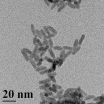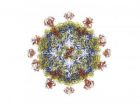(Press-News.org) In a study published recently in the journal Science Signaling Van Andel Research Institute (VARI) scientists demonstrate on the molecular level how the anti-malaria drug chloroquine represses inflammation, which may provide a blueprint for new strategies for treating inflammation and a multitude of autoimmune diseases such as arthritis, multiple sclerosis, and certain cancers.
Chloroquine is a widely used anti-malaria drug that inhibits the growth of parasites. For decades, chloroquine and its derivative amodiaquine have also been used as anti-inflammation drugs to treat diseases such as rheumatoid arthritis, though the exact mechanism of how chloroquine affects the immune system has remained unclear.
By providing an understanding of these basic functions, researchers may now have the necessary tools to develop improved treatments for a myriad of common autoimmune disorders.
"The implications of this study are significant," said Henry F. McFarland, Ph.D., former Chief of the Neuroimmunology Branch of the National Institute of Neurological Disorders and Stroke (NINDS). "These results provide a mechanistic basis for therapeutic strategies for treating inflammation and autoimmune diseases and should provide exciting new approaches which can be tested in clinical trials."
Autoimmune diseases arise when the body's immune system mistakes otherwise healthy cells, tissues, and organs for pathogens and attacks them. These diseases can afflict any part of the body, but one symptom common to most autoimmune diseases is that of inflammation.
The National Institutes of Health (NIH) lists more than 80 common autoimmune diseases including asthma, Crohn's disease, Guillain-Barré syndrome, multiple sclerosis, myasthenia gravis, psoriasis, rheumatoid arthritis, and some types of cancers among many others.
Dr. H. Eric Xu, Head of the VARI Center for Structural Biology and Drug Discovery, and his colleagues showed that chloroquine represses inflammation through synergistic activation of glucocorticoid signaling. Glucocorticoids are a class of steroid hormones that bind to the glucocorticoid receptor present in almost every vertebrate animal cell. They are among the most potent and effective agents for treating inflammation and autoimmune diseases.
Synthetic glucocorticoids are used for treating asthma, allergies, and rheumatoid arthritis. Since glucocorticoids also interfere with some of the abnormal mechanisms in cancer cells, they are also used in high doses to treat certain cancers such as leukemia and lymphoma. However, at therapeutic dosages, glucocorticoids can cause a range of debilitating side effects including diabetes, osteoporosis, skin atrophy, and growth retardation.
"The discovery and development of novel uses of glucocorticoids that retain their beneficial therapeutic effects but reduce undesired adverse side effects remains a major medical challenge," said VARI Research Scientist Yuanzheng He, Ph.D., lead author of the study.
The VARI research revealed an unexpected regulation of glucocorticoid signaling by lysosomal functioning. Lysosomes are organelles found in animal cells that use enzymes to break down waste materials and cellular debris.
Researchers found that they could mimic the effect of chloroquine by inhibiting lysosomes in the cell. They believe that the development of new therapies for treating inflammation and autoimmune disease will involve strategies that combine both glucocorticoid and lysosomal inhibitors.
"We have known for some time that both steroids and lysosomes affect the immune system, but we didn't know that they worked together," said VARI President and Research Director Jeffrey Trent, Ph.D. "Researchers now have a clear path forward for undertaking projects to develop glucocorticoid and lysosomal inhibitors, and to improve the efficacy and potency of chloroquine as a therapeutic agent."
###
The study was supported by an NIDDK/NIH fund (DK066202 and DK071662), an American Asthma Foundation fund (2010), Department of Defense Prostate Cancer Research Program of the Office of Congressionally Directed Medical Research Programs PC081089, and the Jay and Betty Van Andel Foundation.
About Van Andel Institute
Established by Jay and Betty Van Andel in 1996, Van Andel Institute (VAI) is an independent research and educational organization based in Grand Rapids, Mich., dedicated to preserving, enhancing and expanding the frontiers of medical science, and to achieving excellence in education by probing fundamental issues of education and the learning process. VARI, the research arm of VAI, is dedicated to probing the genetic, cellular and molecular origins of cancer, Parkinson and other diseases and working to translate those findings into effective therapies. This is accomplished through the work of over 200 researchers in 18 on-site laboratories and in collaborative partnerships that span the globe. VARI is affiliated with the Translational Genomics Research Institute, (TGen), of Phoenix, Arizona.
END
Business users take advantage of trial software so they can understand exactly what they are purchasing, but they still have to buy support plans on blind faith. One company is changing that. MadCap Software, Inc. (http://www.madcapsoftware.com), the leader in multi-channel content authoring and a showcase company for Microsoft (NASDAQ: MSFT) Visual Studio and Microsoft XPS, today announced that every 30-day free trial version of its technical communications software now also comes with a 30-day free trial of MadCap's Gold Level technical support. Gold Level support during ...
Research published recently in PLoS One delivers new insight about rapid toxin evolution in venomous snakes: pitvipers such as rattlesnakes may be engaged in an arms race with opossums, a group of snake-eating American marsupials. Although some mammals have long been known to eat venomous snakes, this fact has not been factored into previous explanations for the rapid evolution of snake venom. Instead, snake venom is usually seen as a feeding, or trophic, adaptation. But new molecular research on snake-eating opossums by researchers affiliated with the American Museum of ...
BUFFALO, N.Y. -- Quantum dots made from cadmium and selenium degrade in soil, unleashing toxic cadmium and selenium ions into their surroundings, a University at Buffalo study has found.
The research, accepted for publication in the journal Environmental Science and Technology, demonstrates the importance of learning more about how quantum dots -- and other nanomaterials -- interact with the environment after disposal, said Diana Aga, the chemistry professor who led the study.
Quantum dots are semiconductor nanocrystals with diameters of about 2 to 100 nanometers. ...
Howard H. Collens, attorney at the probate and estate planning law firm of Galloway and Collens, PLLC, spoke at a professional training seminar on The Probate Process From Start to Finish for Paralegals, sponsored by the Institute for Paralegal Education (IPE).
The seminar, which took place on June 7, 2011, aimed to increase the understanding and effectiveness of paralegals, legal assistants and legal secretaries during the legal process which may be required after a person dies. Howard H. Collens spoke about topics related to the probate process including the ethical ...
HOUSTON -- (July 18, 2011) -- Rice University scientists have defined the structure -- down to the atomic level -- of a virus that causes juvenile diarrhea. The research may help direct efforts to develop medications that block the virus before it becomes infectious.
The new paper by Professor Yizhi Jane Tao, postdoctoral researcher Jinhui Dong and their colleagues was published in today's online edition of the Proceedings of the National Academy of Sciences.
Tao's Rice lab specializes in gleaning fine details of viral structures through X-ray crystallography and computer ...
PRONicaragua recently announced the organization of the premier investment forum titled Nicaragua, Let's Grow Together!, which will showcase the country's sustainable growth in various economic sectors and its competitive advantages as an attractive destination for foreign direct investment (FDI).
The event will take place on August 16th and 17th in Managua, Nicaragua, and will focus on specialized sectors such as apparel, footwear, food processing and manufacturing, as well as world-class bilingual business process outsourcing (BPO) services. Participants will be coming ...
The Westie Foundation of America (WFA) announced
today preliminary findings in two major studies involving the health of West Highland White Terriers also
known as Westies. Findings in these and other studies of Westies and other dogs
may hold answers for similar human conditions like Inflammatory Bowel Disease (IBD). The studies are
jointly funded by the WFA and the AKC Canine Health Foundation (CHF).
In one study, researchers are looking at the role of a mucosal gene driving inflammation Canine IBD, a
chronic intestinal disorder that creates a bacterial-driven ...
We all make numerous decisions everyday; unconsciously or consciously, sometimes doing it automatically with little effort or thinking and yet, at other times, we agonize for hours over another. Why do we make these choices – be it from deciding what to have for lunch or whether to say yes to that job offer halfway round the world. Sometimes we make choices on our own, and at other times, the choice is made for us. Exercising control (by making choices) is adaptive and now, a new study, which will be published in an upcoming issue of Psychological Science, a journal of ...
What does a passionate founder of a domestic violence charity do when he wants to raise awareness and promote a daily fitness program? Rich Tola, Founder and Chairman of the yoga-inspired nonprofit, The Boulevard Zen Foundation, would say "We're going on a 30,000 mile fundraiser, visiting all 50 states in 100 days. That's 100 cities in 100 days, producing trivia-filled travelogue videos including fat burning workouts that are based on yoga". Ambitious? Yes. Impossible? "Certainly not," says the former Wall Streeter turned actor-filmmaker whose film, ...
FINDINGS: Using a new in vivo screening system, Whitehead Institute researchers have identified a protein in a key metabolic pathway that is essential in estrogen receptor (ER)-negative breast cancer. When the expression of the gene that codes for this protein—phosphoglycerate dehydrogenase or PHGDH—is suppressed in tumors and cell lines with an overabundance of the protein, the rate of cellular growth declines markedly.
RELEVANCE: PHGDH is overexpressed in approximately 70% of ER-negative breast cancer patients. Patients with ER-negative disease respond poorly to treatment ...



